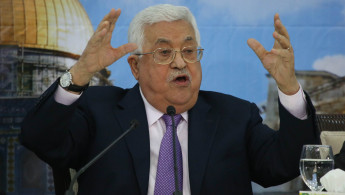Fatah backs long-time Abbas ally for new Palestinian PM
Analysts view bringing in Shtayyeh to replace outgoing prime minister Rami Hamdallah as part of Abbas's efforts to further isolate his political rivals Hamas, who run the Gaza Strip.
The central committee of Fatah backed Shtayyeh to take over the post during a meeting earlier this week, the senior officials said on condition of anonymity.
The recommendation is not binding on Abbas, but he is expected to back the decision, the officials said.
Shtayyeh, born in 1958, is a long-term Abbas ally and member of the Fatah central committee. He would replace Hamdallah, who was politically independent.
Shtayyeh has been part of a number of Palestinian negotiating teams in US-brokered talks with Israel, and is a former government minister.
He is also an academic and economics professor.
Twitter Post
|
Hamdallah's government submitted its resignation in late January, though it has continued on an interim basis.
Abbas remains the primary decision-maker and interlocutor with the international community.
Palestinian politics has essentially been paralysed since 2007, when Hamas seized control of the Gaza Strip from Abbas's forces in a near civil war, a year after winning parliamentary elections.
Since then Abbas's governments have maintained limited self-rule in the occupied West Bank, while Hamas has led a rival administration in Gaza.
The previous government was formed during a period of improved relations and had the backing of Hamas.
This government will instead be dominated by Fatah, though other smaller parties will be represented. Hamas will not be included.
Abbas in December said he would dissolve the Palestinian Legislative Council, a move seen as intended to weaken Hamas which holds a majority of the seats in the council.
Abbas was elected in 2005 for an initial four-year term but no elections have been held since then due to the Fatah-Hamas split.
The Palestinian Authority has in the past slashed the salaries of former government workers in Gaza and cut fuel subsidies to pay for electricity - measures aimed at pressuring Hamas.
It has also been accused of blocking large-scale reconstruction projects in Gaza that were approved by Israel.
Agencies contributed to this report.





 Follow the Middle East's top stories in English at The New Arab on Google News
Follow the Middle East's top stories in English at The New Arab on Google News
![Israeli forces ordered bombed Gaza's Jabalia, ordering residents to leave [Getty]](/sites/default/files/styles/image_330x185/public/2176418030.jpeg?h=a5f2f23a&itok=_YGZaP1z)

